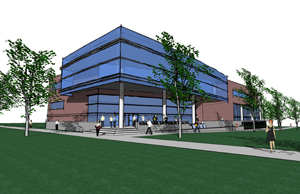|
A program statement and budget for construction of the new building will be submitted for approval of the University of Nebraska Board of Regents at the March 7 meeting.
The new building, which will cost $16.5 million, has been made possible by a donation from Ruth and Bill Scott, longtime supporters of UNMC and the University of Nebraska. Construction is slated to begin in January 2009 with completion in April 2010.
The College of Public Health will be south of Dewey Avenue on the east side of 40th Street in what is presently a UNMC parking lot. It will be flanked by the UNMC Eye Clinic on the north and the UNMC Student Life Center on the south. The 52,500-square-foot facility will boast three levels and will be one of the most state-of-the-art buildings on the UNMC campus.
“This is a defining moment for the College of Public Health,” said Jay Noren, M.D., founding dean of the college. “Since we first established the college in 2006, our goal has always been to have our own building. We can’t thank the Scotts enough for allowing us to make this dream come true.
“The new building will allow us to recruit exceptionally talented faculty from across the United States.”
Students attending the College of Public Health will be able to earn a master’s degree as well as doctoral degrees. Currently, 78 students are enrolled in the master’s program with 15 students enrolled in the Ph.D. program.
“We’ve come a long way in two short years,” Dr. Noren said. “We’ve been bringing in about 20-25 new students each year and 45 students have already earned degrees. We’re very pleased with this response. The new building will no doubt generate more interest among students in an environment and time when well-trained public health graduates are needed.”
Dr. Noren noted that the new building will feature technology that will bring public health classes to students around the state via distance education.
Ruth Scott praised the College of Public Health for its role in addressing some of the major health care issues faced by society, such as childhood obesity, diabetes and heart disease.
“I don’t think most people give public health much thought,” she said. “I like to say there is a silent epidemic going on for which there must be answers.
“You can visit any school and see many children who are overweight. We have to address this issue before it’s too late, before these children become adults and start having heart problems and other compromising health issues. That’s where the College of Public Health is a perfect fit for Nebraska. The college is taking a leadership role in these societal problems and looking for preventive measures that can make a difference. Bill and I are thrilled that we can help support this effort.”
The College of Public Health, which is the first new college at UNMC since 1968, became fully operational in January 2007. Although there are 125 academic medical centers in the United States like UNMC, only 38 have public health colleges. Furthermore, there are no other colleges of public health in a large section of the country spanning 1,400 miles between Iowa and Washington and 800 miles between Minnesota and Oklahoma. Thus, the new UNMC College of Public Health is well placed to serve Nebraska and the entire region, Dr. Noren said.
Since the college’s inception, faculty and staff have been spread across the UNMC campus in a variety of locations, including some leased space.
 |
An artist’s rendering of the College of Public Health building, which UNMC seeks to place on 40th Street thanks to a gift from Omaha philanthropists Ruth and Bill Scott. |
The building will provide faculty office space for the five departments and six centers that make up the college. In addition, it will include classroom space and conference rooms as well as dedicated areas conducive to interdisciplinary outreach and research projects.
“Public health impacts everyone,” Dr. Noren said. “It ties in perfectly with UNMC’s mission to improve the health of Nebraska.”
The potential economic impact of the college is significant, he said, as externally generated outside grants and contracts compose more than 50 percent of the college’s budget.
The college builds on UNMC’s existing strengths and will offer expertise in many different areas, including health disparities, health promotion and wellness, community health education, surveillance methods to detect infectious disease epidemics, analysis of trends in major chronic diseases and rural health issues, environmental health, education of health system leaders, health services research, workplace health and safety and accident prevention.